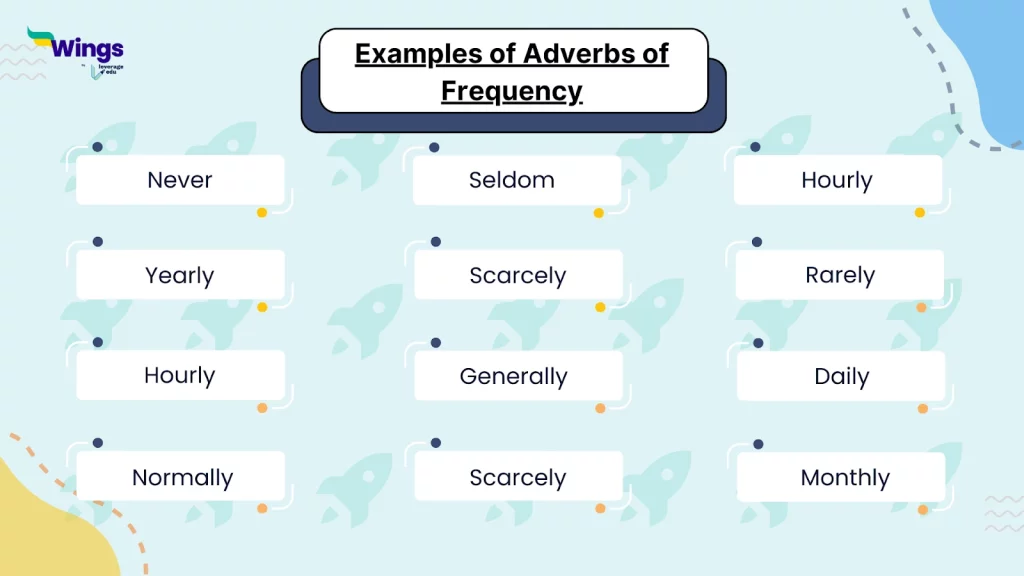Present Simple Tense Adverbs: Present Simple Tense talks about your daily practice or things that you do and happen regularly. Adverbs are words that add particulars about these routines. Two main types of adverbs are used with the present simple tense: frequency adverbs and time adverbs. By adding these adverbs you can create a clearer view of your practices and habits in the Present Simple Tense. In this blog, you will go through the types of adverbs, meaning, examples and much more.
What are Present Simple Tense Adverbs?
The simple present tense is generally utilised with the adverbs always, usually, seldom, never, sometimes, often, frequently, habitually, occasionally, once, twice, thrice etc. Here are some sentence examples for your reference:
I drink a glass of juice every morning.
My mother never tells lies.
She usually spends my evenings with my kids.
Types of Present Simple Tense Adverbs
Two major types of present simple tense adverbs work like helpers to your sentences, making them meaningful about habits and routines:
Frequency Adverbs
These tell you how frequently something happens. Imagine them as a minor plan for your actions. Below are some examples:
Always: This means something that happens every single time, without exception.
For example: “He always wakes up at 8 am.”
Usually: This represents something that occurs most of the time, but not always.
For example: “He usually finishes his homework before dinner.”
Often: This represents something that happens quite a bit, but only some of the time.
For example: “They often go to lunch on Saturdays.”
Sometimes: This represents something that happens sometimes, but not very frequently.
For example: “It sometimes rains in the summer here.”
Rarely: This represents something that happens very infrequently.
For example: “I rarely eat healthy food.”
Never: This suggests something does not occur at all.
For example: “He never forgets his lunch.”
Time Adverbs
These tell you when in general something occurs, not the exact time. Think of them as meaning to a general timeframe. Here are some examples:
Today: This means something occurs on this particular day.
For example: “The mail usually arrives today around noon.”
Tonight: This means something happened this evening.
For example: “They are watching a movie tonight.”
Every day: This represents something that happens daily.
For example: “He exercises every day.”
Once a week: This represents something that happens every seven days.
For example: “We go outside once a week.”
Lately: This means something has been happening more than usual in the recent past.
For Example “Lately, I’ve been feeling tired.”
Recently: This indicates something happened not too long ago.
For example: “We recently went on a trip to the beach.”
Present Simple Tense Adverbs of Frequency
An adverb of frequency is a word that is used in a sentence to provide more additional information about the verb, adjective or another adverb. Adverbs of frequency can be set after the noun or pronoun that functions as the subject and before the verb if there is just one verb in a sentence.
Examples of Adverbs of Frequency
Mentioned below are some of the examples that students can refer to:
- She always makes my bed in the morning.
- He usually drinks hot coffee for breakfast.
- They often go for walks after dinner.
- She sometimes forgets her keys.
- We rarely go out to eat.
- They never miss my favourite movie.
- My sister occasionally helps me with chores.
- He frequently checks his social media.
- They seldom have arguments.
- We every now and then go on a weekend getaway.
List of Adverbs Frequency
Here are some examples of adverbs of frequency for your reference:

Present Simple Tense Adverbs Practise Exercise
Instruction: Choose the appropriate answer to complete the following sentence.
1. He ________________ late on Sundays.
a. Get up usually
b. Get usually up
c. Usually get up
2. Ramesh ______________ late for work.
a. Never is
b. Is never
3. _______________ on weekends?
a. Often do you travel
b. Do you often travel
c. Often you travel
4. Rahul ________________ early for class.
a. Often is
b. Are often
c. Often are
d. Is often
5. When do you ____________ go on vacation this year?
a. Always
b. Never
c. Usually
d. Ever
Answers:
- C. I usually get up late on Saturdays.
- A. Ramesh is never late for work.
- B. Do you often getaways on weekends?
- D. Rahul is often early for class.
- D. When do you usually go on vacation each year?
Related Reads on English Grammar
FAQs
He was walking slowly, My sister and I ran quickly to get the train, She stopped the car abruptly, and My grandmother smiled cheerfully.
Adverbs of frequency are usually used to show routine or repeated activities, so they are usually used with the present simple tense.
Adverbs can be categorised into six main types:
Adverbs of Manner, Adverbs of Time, Adverbs of Place, Adverbs of Frequency, Adverbs of Degree, Conjunctive Adverbs.
An example of a simple present tense adverb is “always”. It indicates how frequently an action occurs in the present. For example: She always reads before bed.
10 examples of simple present tense:
I eat breakfast every morning.
She goes to school by bus.
They work in an office.
He plays football on weekends.
We study together every evening.
The sun sets in the west.
Birds fly in the sky.
I like coffee.
She teaches English at the school.
You walk to the park every day.
An example of an adverb of frequency in the present simple tense is “never”. For example: I never eat junk food.
This was all about the present simple tense adverbs in English grammar. Hope you understand the concept and know how to proceed. You can also follow the page of Leverage Edu for more exciting and informative blogs on Learn English.


 One app for all your study abroad needs
One app for all your study abroad needs












 60,000+ students trusted us with their dreams. Take the first step today!
60,000+ students trusted us with their dreams. Take the first step today!